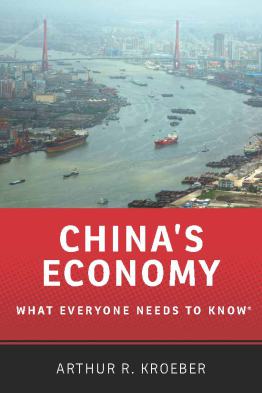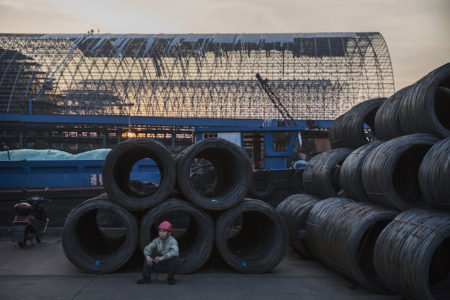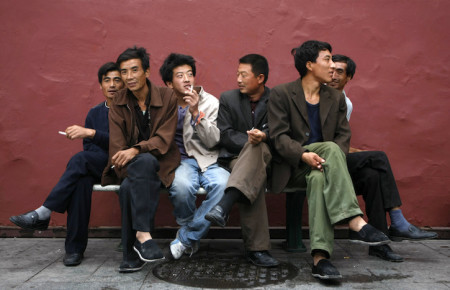At a recent Council on Foreign Relations forum in New York, Tsinghua University Law Professor Gao Xiqing, former chief investment officer of China Investment Corp. and official of the China Securities Regulatory Commission, said he is encouraged by the policies set out in the Five Year Plan. On the other hand, Gao alluded to apparent setbacks for China’s economic reforms. Speaking about a quota set by the government for cutting steel overcapacity, Gao said: “They’re basically giving up what the Party said, …the 18th Party Congress, that let the market be the decisive force of allocating resources.” So what’s going on with China’s economy? Below, three smart reads.
![]()
 Is China’s economy—struggling with unbalanced growth and dangerously high debt levels—on the brink of collapse? Or, with a strong government suited to manage its current challenges, is China set to outpace the United States as the global economic powerhouse? Neither, according to leading China economic analyst Arthur Kroeber. In a new book, China’s Economy: What Everyone Needs to Know, reviewed here in The Economist, Kroeber argues that China instead is likely to “muddle” through. Contrary to conventional wisdom, Kroeber writes that China can still afford to grow through investment. And he says a property crash is unlikely, in part because there is no mortgage crisis: Chinese homeowners pay at least 20% down, and often the whole amount in cash. On the other hand, Kroeber thinks continued state control over the economy will hamper the innovation needed to make the transition to a high-income economy. (The Paulson Institute’s Contemporary China Speakers Series will host Kroeber on Monday, May 16, in Chicago.)
Is China’s economy—struggling with unbalanced growth and dangerously high debt levels—on the brink of collapse? Or, with a strong government suited to manage its current challenges, is China set to outpace the United States as the global economic powerhouse? Neither, according to leading China economic analyst Arthur Kroeber. In a new book, China’s Economy: What Everyone Needs to Know, reviewed here in The Economist, Kroeber argues that China instead is likely to “muddle” through. Contrary to conventional wisdom, Kroeber writes that China can still afford to grow through investment. And he says a property crash is unlikely, in part because there is no mortgage crisis: Chinese homeowners pay at least 20% down, and often the whole amount in cash. On the other hand, Kroeber thinks continued state control over the economy will hamper the innovation needed to make the transition to a high-income economy. (The Paulson Institute’s Contemporary China Speakers Series will host Kroeber on Monday, May 16, in Chicago.)

![]() A recent IMF Report on China’s plans to deal with its bad debts warns that converting non-performing loans into equity or securitizing them “could worse the problem…by allowing zombie firms (non-viable firms that are still operating) to keep going.” Crucial, the paper argues, will be a rigorous process of assessing which firms are actually viable and the liquidation of the real losers. The authors also warn that banks don’t have the necessary expertise to run or restructure businesses, and that conversion of debt into equity “creates moral hazard and conflicts of interest.” What the paper doesn’t contend with is the political difficulty inherent in following the authors’ advice.
A recent IMF Report on China’s plans to deal with its bad debts warns that converting non-performing loans into equity or securitizing them “could worse the problem…by allowing zombie firms (non-viable firms that are still operating) to keep going.” Crucial, the paper argues, will be a rigorous process of assessing which firms are actually viable and the liquidation of the real losers. The authors also warn that banks don’t have the necessary expertise to run or restructure businesses, and that conversion of debt into equity “creates moral hazard and conflicts of interest.” What the paper doesn’t contend with is the political difficulty inherent in following the authors’ advice.

![]() China’s Five Year Plan aims to move the country’s economy away from investment-driven growth to a more consumer-oriented and services-focused model. But in a recent Paulson Policy Memorandum, CASS researcher Zhang Bin argues that dominance of state-owned enterprises (SOEs) in many of China’s services sectors is crowding out private capital. Since China’s SOEs are often not efficient market players, potential investment opportunities in the services sector are being left untapped. Economic stimulus—any effort to prop up distressed industrial firms—will likely result in more debt, Zhang writes, exacerbating China’s economic difficulties. Instead, attention should be devoted to stabilizing the labor market.
China’s Five Year Plan aims to move the country’s economy away from investment-driven growth to a more consumer-oriented and services-focused model. But in a recent Paulson Policy Memorandum, CASS researcher Zhang Bin argues that dominance of state-owned enterprises (SOEs) in many of China’s services sectors is crowding out private capital. Since China’s SOEs are often not efficient market players, potential investment opportunities in the services sector are being left untapped. Economic stimulus—any effort to prop up distressed industrial firms—will likely result in more debt, Zhang writes, exacerbating China’s economic difficulties. Instead, attention should be devoted to stabilizing the labor market.


